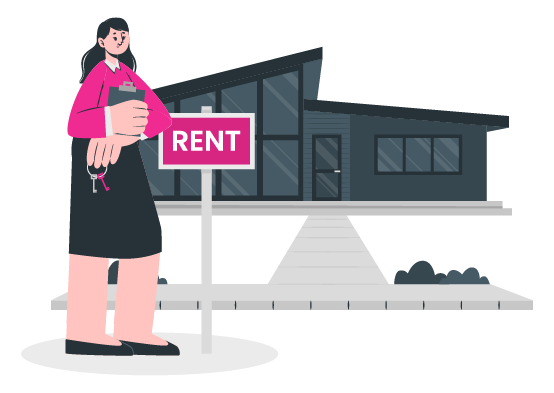Renovating a leased office space can be an exciting yet complex process. Whether you’re looking to enhance your team’s productivity, improve your office environment, or simply update the space, it’s essential to understand the rules surrounding office renovations, especially in the context of a lease agreement. In this blog post, we’ll guide you through the various factors you need to consider when planning an office renovation in Ireland, including how to navigate lease agreements, obtain necessary permissions, and avoid potential legal issues.
If you are unsure about the space you need for your office renovations, an office space calculator can be a useful tool to ensure that you are making the right choices for your team size and work requirements. You can access the FindQo.ie Office Space Calculator, it’s free, requires no sign-up, and provides AI-driven insights tailored for office planning in Ireland.
Understanding Lease Terms for Office Renovations
Before starting any renovation project, the first thing you need to do is check your lease agreement. The lease terms will typically specify whether renovations are allowed, what type of modifications are permissible, and the process for seeking approval. Here are some key points to consider:
1. Permission to Renovate
Most lease agreements will require tenants to seek permission from the landlord before making any alterations or renovations to the office space. This is crucial because the landlord retains ownership of the property, and any changes you make may affect its value.
Some lease agreements may allow minor changes, such as installing new fixtures or painting walls, without requiring landlord approval. However, more significant changes, like structural alterations, need formal consent.
2. Scope of Renovations
It’s important to determine what constitutes a “renovation” under the terms of your lease. For example, installing new partitions, upgrading the flooring, or reconfiguring plumbing might fall under renovations, while cosmetic changes such as re-painting or redecorating may be considered routine maintenance.
A clearly defined scope will help you avoid any disagreements with the landlord later on.
3. Reversibility of Renovations
Landlords often require tenants to return the office space to its original condition at the end of the lease. This means that if you make any renovations, you may be required to reverse them before you move out. This is an important consideration when planning major alterations, as reversing changes can incur additional costs.
4. Restrictions on Certain Renovations
In some cases, your lease agreement may prohibit certain types of renovations altogether. For example, alterations to structural elements, electrical systems, or fire safety features might be restricted due to safety and compliance regulations. Be sure to review these limitations carefully to avoid violating your lease terms.
The Role of the Office Space Calculator in Renovation Planning
Planning an office renovation often requires a clear understanding of your space needs. This is where an office space calculator can help. The FindQo.ie Office Space Calculator is a powerful tool that assists you in determining the ideal size and layout for your office space, taking into account factors like team size, workstations, and the type of workspace needed.
Using this calculator, you can input specific details about your company’s needs, such as the number of employees and the preferred work environment (open-plan, private offices, etc.). The AI-driven insights provided by the tool help you plan efficiently and cost-effectively, ensuring that any renovations align with your current and future office space requirements.
You can access the FindQo.ie Office Space Calculator here. It’s free to use, with no sign-up required and no limits on the number of times you can calculate your ideal space.
Navigating Planning Permissions and Legal Requirements
When renovating a leased office in Ireland, there are specific legal requirements that must be adhered to. Some renovations may require planning permission from the local authorities, particularly if the changes affect the building’s structure or exterior. Below are some common scenarios where planning permission might be needed:
1. Structural Alterations
If your renovation involves altering load-bearing walls, expanding the office space, or changing the building’s external appearance, you will likely need to apply for planning permission. This type of renovation could impact the building’s structural integrity or change its appearance, both of which are regulated by local planning laws.
2. Change of Use
If your renovation changes the use of the office space (for example, converting it into a retail space or a café), you may need to apply for a change of use permission from the local authorities. This is particularly important if the office is located in a building with mixed-use zoning or in a heritage building.
3. Health and Safety Regulations
Certain renovations, especially those that involve changes to electrical systems or plumbing, must comply with health and safety regulations. Ensure that your renovations meet all legal requirements for fire safety, electrical standards, and accessibility, as failing to comply could lead to legal liabilities.
What Happens If You Don’t Follow the Rules?
Failure to adhere to the rules and regulations for office renovations can have serious consequences. If you renovate your office space without the landlord’s permission or in violation of your lease agreement, the landlord may have the right to terminate the lease or impose fines. In addition, non-compliance with planning regulations could result in fines or even the requirement to reverse the renovations.
Therefore, it is vital to ensure that all renovations are well-planned, legally compliant, and agreed upon by both you and your landlord.
Special Considerations for Startups, Hybrid Teams, and Remote-First Companies
When considering renovations, it’s important to think about how the space will cater to the specific needs of your team. Different types of businesses have unique requirements when it comes to office space.
1. Startups
Startups often need flexible spaces that allow for future growth. If you’re in the early stages of setting up your business, your renovation plans may focus on creating a scalable, adaptable environment that can accommodate a growing team. An office space calculator can help determine how much space you’ll need both now and in the near future.
2. Hybrid Teams
Hybrid teams, where employees split their time between the office and remote work, need to balance private spaces with collaborative areas. Renovations for hybrid teams should focus on creating a comfortable, flexible work environment, with designated spaces for both focused work and collaboration. Using an office space calculator can help you identify how much space is needed for these different zones.
3. Remote-First Companies
For remote-first companies, the need for a physical office might be minimal. However, if a physical location is still required for occasional meetings or team gatherings, it’s important to design a space that meets these needs without being overly large or underutilised. Again, an office space calculator can help determine the optimal size for this type of office setup.
Renovating a leased office in Ireland requires careful consideration of your lease agreement, local planning regulations, and the unique needs of your business. Before starting any renovations, review your lease terms, seek permission from your landlord, and ensure compliance with all legal requirements. Additionally, using tools like the FindQo.ie Office Space Calculator can help you plan your space more effectively and avoid unnecessary renovations. The tool is free, no sign-up is required, and it offers AI-driven insights to guide your office space planning in Ireland.
If you’re ready to plan your office space renovation, try out the FindQo.ie Office Space Calculator. It’s a valuable resource for ensuring that your space fits your team’s needs, whether you’re in a startup phase, operating a hybrid team, or running a remote-first company.

